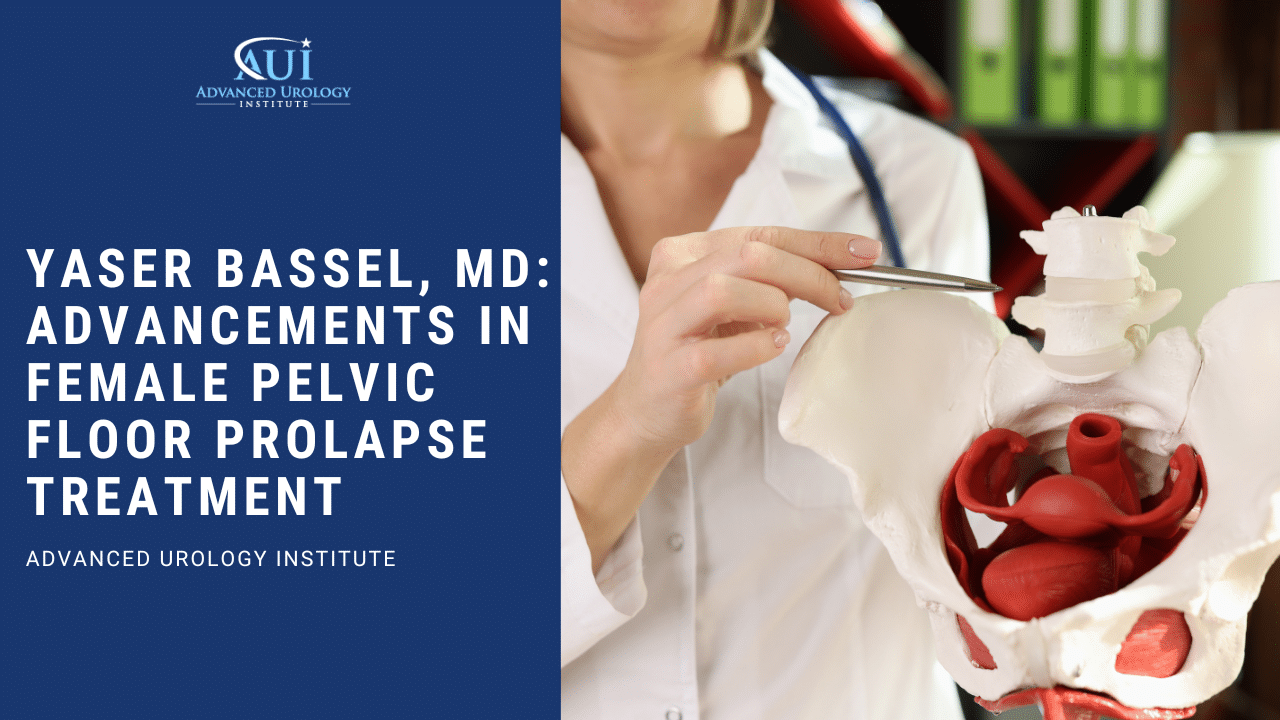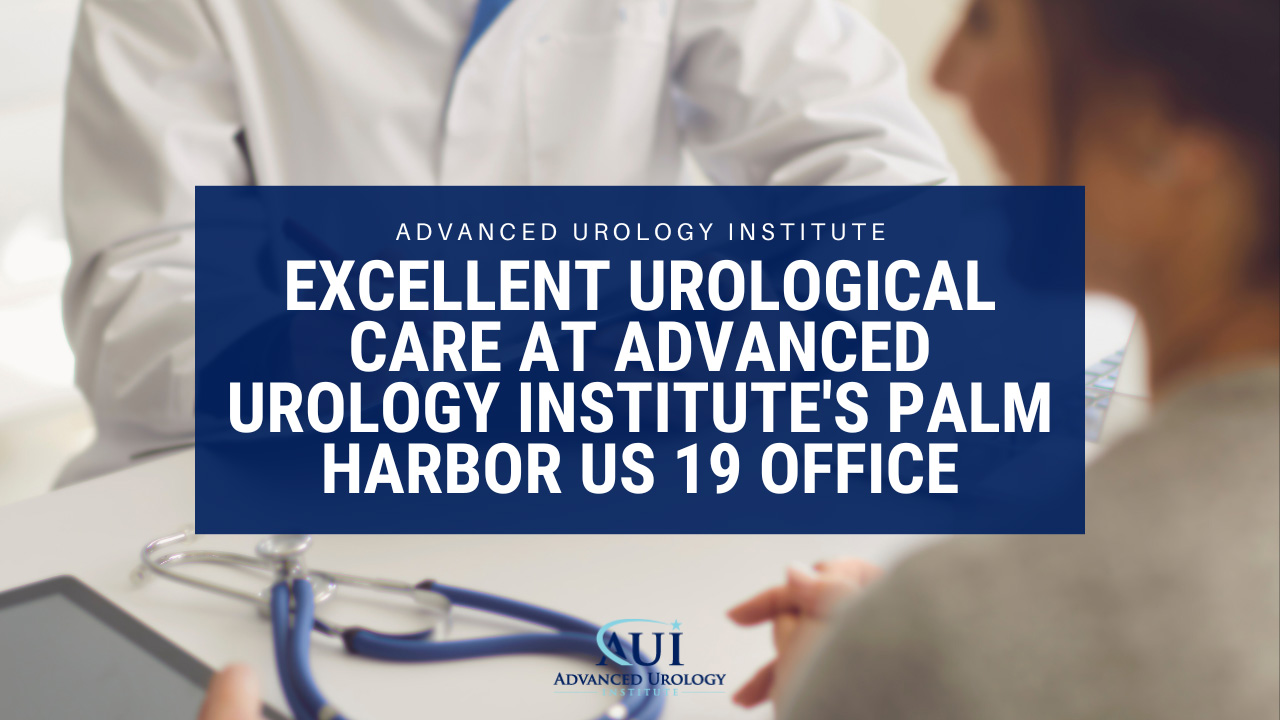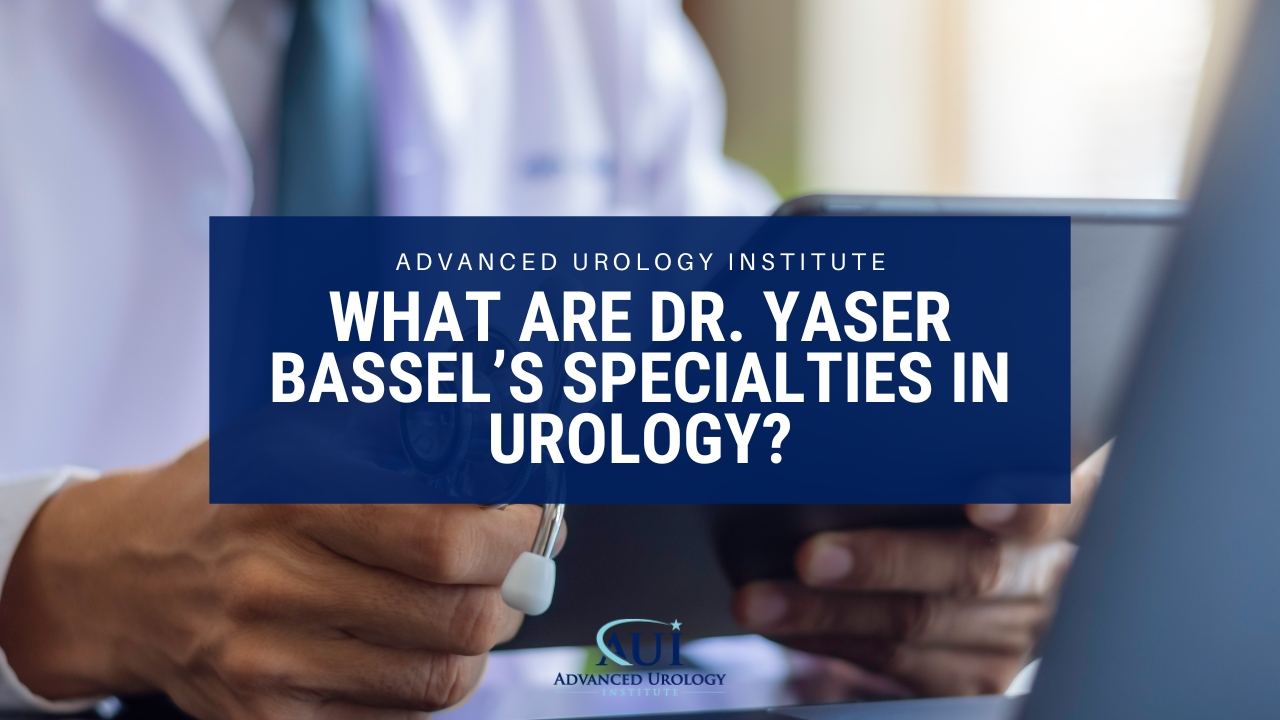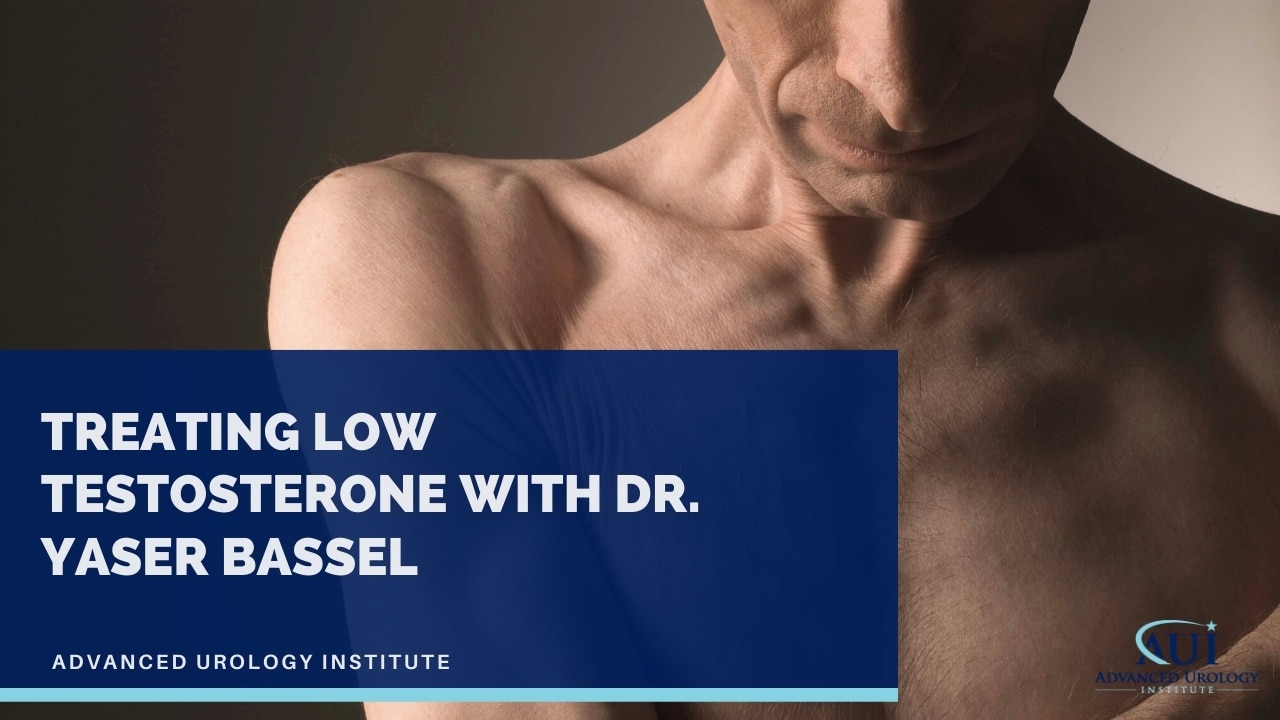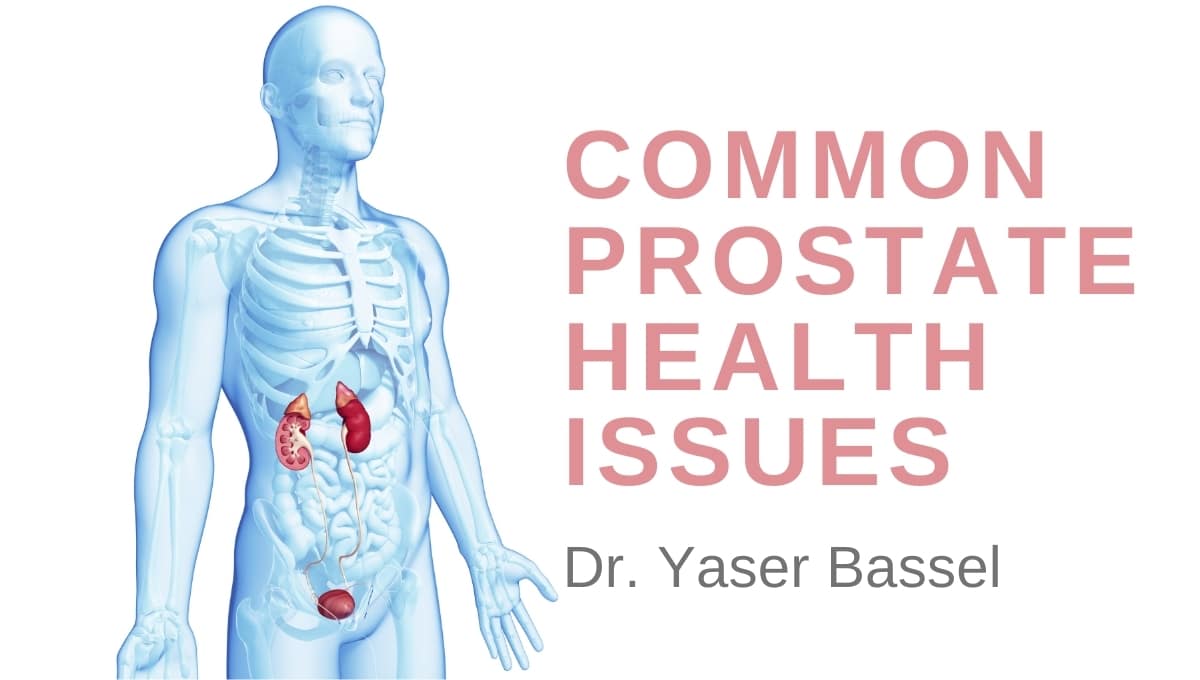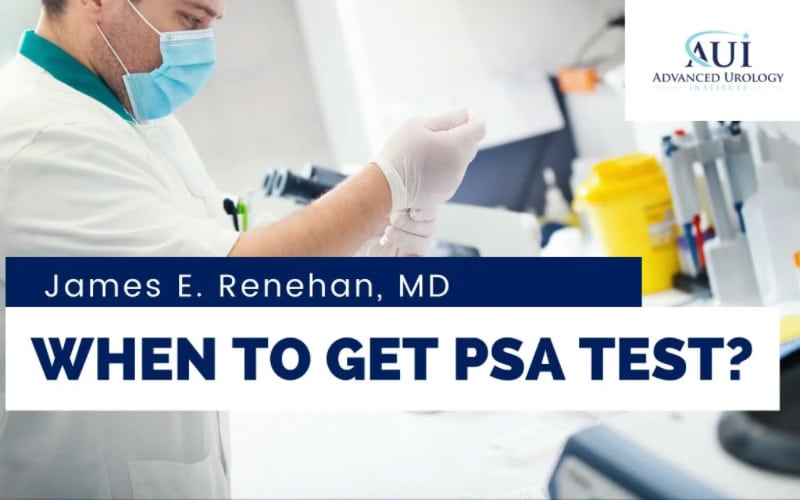Exploring Innovative Solutions for Women’s Health 🩺 Yaser Bassel, MD: Advancements in Female Pelvic Floor Prolapse Treatment
Continue readingExcellent Urological Care at Advanced Urology Institute’s Palm Harbor US 19 Office
Advanced Urology Institute’s office in Palm Harbor, FL is designed to deliver nothing less than top-tier urological care. Learn more here.
Continue readingWhat are Dr. Yaser Bassel’s specialties in urology?
Dr. Bassel main interest is robotic surgery in urology, which allows for precision and minimally invasive treatment of cancer-related issues.
Continue readingRadiation Therapy for Prostate Cancer
My name is Yaser Bassel, I’m a board certified urologist with Advanced Urology Institute. With Radiation Therapy there are different means of administering radiation, there are seeds that can be implanted, there’s external beam radiation therapy and sometimes radiation
Continue readingHow Does Dr. Yaser Bassel Approach Treating Low Testosterone?
My Name is Yaser Bassel, I’m a Board-Certified Urologist with Advanced Urology Institute. Low testosterone at this point has come to the forefront a lot of times because of the advertising done by manufacturers of Testosterone. But for men
Continue readingWhen Is the Right Time for a PSA Test, According to Dr. Yaser Bassel?
Common Prostate Health Issues – Dr. Yaser Bassel
Are Medications Effective in Treating Erectile Dysfunction – Dr. Yaser Bassel
My name is Yaser Bassel, I am a board-certified urologist with Advanced Urology Institute.
 I would say the vast majority of them, especially if they have not tried medications prior to them being seen in our office, probably 70-80 percent of those men will at least have a response to the medication oftentimes enough to basically be satisfactory to the patient or make them pleased with the way the medication is working. So most of them would actually get a good response to the medication.
I would say the vast majority of them, especially if they have not tried medications prior to them being seen in our office, probably 70-80 percent of those men will at least have a response to the medication oftentimes enough to basically be satisfactory to the patient or make them pleased with the way the medication is working. So most of them would actually get a good response to the medication.
Are there other treatment options for ED?
As far as what we have available to us now and what’s on the forefront, [for] those patients that do not want medication there are some newer technologies that are available that utilize shockwave energy to try and create newer vascularity in order to get a better response for that medication and that is something that’s basically come out over the past couple of years that we are starting to utilize in our practice. For those that do not respond to medication and still want to have treatment, the next step oftentimes [is] performing a test called a Penile Doppler where we will inject the penis with a vasoactive medication which will then initiate an erection so that we can measure blood flow and also measure for a venous leak which are two reasons why patients can have issues with erectile dysfunction.
If you are in need of a consultation or have any questions, visit us at our Tampa, FL office or call us at (813) 749-0820.
How is Prostate Cancer Diagnosed
About 70 percent of men diagnosed with prostate cancer through PSA screening have low-risk, low-grade disease. Unfortunately, over 90 percent of these men are placed under aggressive treatment soon after diagnosis when in real sense up to 60 percent of them may not need treatment, even in the long-term. Why does this happen? The common screening tests are not able to distinguish between men with prostate cancer that requires treatment and those with clinically insignificant disease. In fact, the PSA test, which is the most frequently used screening test, gives up to 12.5 percent false positive results.
Tackling overdiagnosis and overtreatment
There have been growing concerns over the increased number of prostate cancer cases diagnosed and treated following PSA testing. For instance, overdiagnosis through PSA tests has resulted in more men undergoing biopsy, which comes with adverse effects such as pain, acute urinary retention and urosepsis. Likewise, for men placed immediately under aggressive treatment, there are concerns over psychological distress and adverse effects to treatment such as urinary incontinence, bowel dysfunction and erectile dysfunction, among others, which are typically longstanding and life-altering. So because of the quality-of-life issues and financial costs, attention is shifting to ways of minimizing the harm caused by PSA screening, particularly ways of mitigating the conversion of overdiagnosis to overtreatment.
Risk-based screening
At Advanced Urology Institute, we have designed our screening, diagnosis and treatment processes for prostate cancer to respond to these growing concerns and minimize both overdiagnosis and overtreatment. For instance, we have included a candid patient-urologist discussion of both the PSA and digital rectal exam to make sure our patients are properly informed of their pros and cons. We also perform these screening tests in an individualized manner, based on each patient’s risk factors. As a baseline, we allow men to take their first PSA screening only when in their 40s. This enables us to develop the right screening protocol for each patient.
If a man’s PSA is low during the first test, we generally consider him to have a low lifetime risk of the disease and may not recommend frequent PSA measurements for him. And if we find PSA < 2 for a man in his 60s, we consider him to have a negligible chance of dying from the cancer and recommend that he not undergo any further PSA screening. It’s only for men with higher risk, such as those who have had a first-degree relative with the cancer — which doubles their risk of developing prostate cancer — that we may recommend more frequent screening.
Taking advantage of newer diagnostic tools
Previously, any man with a PSA result that was worrisome, such as one showing a rise over time or has an absolute high value, would automatically be a candidate for biopsy. At Advanced Urology Institute, we have changed this and now may perform other tests before we can recommend a biopsy. For instance, we can use a second test called PCA3 to define a man’s risk level and assess whether or not a biopsy is necessary for him. The PCA3 is a more specific marker for prostate cancer than the PSA and it can be measured in urine, usually after a DRE. Similarly, we can assess the aggressiveness of a tumor through genomic testing and use the results to determine whether immediate treatment or active surveillance is appropriate. So we use such tests to reduce the harm that our patients may suffer from biopsies done due to PSA-based overdiagnosis.
Individualized approach to treatment
To further reduce the chances of treating indolent prostate cancer, we use a combination of PSA and biopsy to assess and classify patients according to degree of aggressiveness of their disease. At AUI, we are committed to minimizing unnecessary, worthless or even harmful treatment after cancer diagnosis. Our most preferred management strategy, particularly for men diagnosed with localized, low-risk prostate cancer, is active surveillance as opposed to immediate treatment. It involves following men with low-grade, low-risk cancer closely and only providing treatment for tumors that exhibit aggressive behavior or are spreading to other areas of the body. Through careful observation, we have realized that a majority of men do not need treatment and therefore are spared the unnecessary aggressive interventions.
During active surveillance, we usually recommend serial PSA testing and biopsy to help monitor the behavior of the tumor. Before we put patients on active surveillance, we inform them that there is a possibility that the cancer may spread to keep them psychologically prepared just in case we detect progress. We also make them aware of the cancer-specific mortality with and without treatment, which is usually less than 10 percent without treatment and reduced by about 50 percent with radiation or surgery. We also inform them of the pros and cons of active surveillance and provide them with all the information they need to make personal treatment decisions.
Our approach is quite different for patients with high-risk prostate cancer. For them, we usually begin curative treatment as soon as possible, using the tools available to deliver safe, timely and effective treatment. The most common treatments for high-grade, high-risk prostate cancer are radiotherapy, high-intensity frequency ultrasound and robotic prostatectomy. Want to know more about prostate cancer screening, diagnosis and treatment? Visit the “Advanced Urology Institute” site.
Dr Yaser Bassel – Becoming a Urologist
Are you a frank, compassionate and approachable person who likes to help others? If so, then urology may just be the right medical specialty for you. Committed to a lifetime occupation of resolving troubling, embarrassing and depressing conditions of the genitourinary tract, urologists have a wonderful opportunity and privilege of making people’s lives better. They are skilled in tackling issues that most people are shy to speak about, helping patients open up and talk about the most awkward conditions and having the ability to restore a sense of hope and contentment in their lives.
What does a urologist do?
As a urologist, you provide diagnosis, treatment and follow-up care to people with urinary tract disorders, including kidney stones, pelvic pain, urinary incontinence, male sexual dysfunction, urologic cancers, genitourinary tract injuries, Peyronie’s disease, priapism, enlarged prostate and male infertility. You also do urinary tract reconstruction and perform procedures to treat disorders of the urethra, bladder, adrenal glands, ureters and kidneys. While the kind of treatment varies from one patient to another, a typical treatment may include surgery or medication, or both.
Why urology?
Curing people with various medical problems is something I always wanted to do from a very young age. I developed a passion for medicine and yearned for a future where I would be there to help people. But it is the striking prevalence of urological disorders I often encountered, together with my medical school mentors, that sparked my interest in urology. Urology also struck me as the area of medicine where I would thrive and would be needed most — caring for people, developing lasting relationships with patients and making a tangible difference in their lives.
Path to urology
I was born in Egypt but moved with my family to the United States when I was just 3 years old. In the U.S. my family moved around quite a bit and we lived in the Midwest for a period of time before eventually settling in Florida. I went to King High School in the Tampa Bay area, then attended the University of Florida for my undergraduate degree in Microbiology (with a minor in Chemistry). I graduated with honors and achieved a National Merit Scholar, enabling me to go to the University of South Carolina in 2007 for medical school. After getting my medical degree, I joined the Emory University Hospital, Atlanta, for my urology residency.
Going through medical school, I started to explore areas where I could specialize. I wanted to pursue a surgical subspecialty that could help me make the most impact on people’s lives. I also wanted a specialty that would enable me to be directly involved with the patients, establishing lasting relationships with them and seeing their lives improve. And because I was fascinated by the wide range of techniques and procedures in urology and its exciting blend of the best of both worlds of surgery and medicine, I chose urology.
Areas of expertise
As a urologist, I perform both routine and specialized procedures to help patients with urological conditions. I administer antibiotics to patients with recurrent urinary tract infections, hormone therapy for prostate cancer, chemotherapy for urological cancers, and phosphodiesterase-5 (PDE5) inhibitors such as tadalafil or Cialis for men with erectile dysfunction. I also use various surgical techniques like minimally invasive surgery, laparoscopic surgery, robotic surgery, or laser therapy for kidney stones, BPH, cancer, among others. I am frequently involved in surgery to repair the urinary tract after traumatic injury, remove a tumor, remove or break up kidney stones, transplant or remove a kidney, relieve incontinence (like the sling procedure) and relieve urethral strictures caused by scar tissue (a procedure called urethral dilation).
With my skill and experience in minimally invasive surgery, using both laparoscopic techniques and the da Vinci robotic system, I am often called upon to perform complex surgical procedures to treat various genitourinary disorders. Single incision da Vinci robotic surgery provides enhanced 3D, high-definition cameras and complete control robotic arms, ensuring high-precision surgery for removal of a cancerous prostate and treatment of conditions such as prostatitis, enlarged prostate, kidney obstructions, bladder disease and urinary incontinence whenever prescription drugs and other medical therapies fail to help.
Job satisfaction
Like most other medical specialties, urology is a highly demanding field that requires extreme commitment and dedication. Right from intense schooling, continuous medical training, chaotic work schedule, to the hopelessness felt when patients are diagnosed with advanced disease, urology comes with its fair share of frustrations and stresses. But working through these challenges and being able to consistently deliver timely, safe and effective solutions to those in severe need is remarkably satisfying.
Besides, practicing urology is never dull. From the amazing technologies used and the different kinds of people you see each day to the various issues you resolve daily, you are sure to encounter something fun and exciting. You also have the opportunity to interact with your patients, win their trust, and establish enduring relationships. For me, to be able help people overcome devastating and awkward conditions and see their lives improve is what I really find gratifying in urology.
Why Advanced Urology Institute?
I joined Advanced Urology Institute soon after my urology residency and ten years later I still love this place. It’s wonderful with the people you work with at AUI and the systems, technologies and equipment available to use. And with all our administrative work managed through a centralized system, we have all the time to concentrate on delivering the very best care to our patients.
You are not just surrounded by knowledgeable, experienced and certified professionals, you are encouraged to collaborate with them through AUI’s multidisciplinary patient-centered approach to care. This allows you to develop your skills and proficiency, grow quickly in your area of specialization and achieve your career dreams. I couldn’t have found a better place to practice urology than AUI.
Looking for more information on how to become a urologist? Or are you or your loved one in need of urological services? Get more information on urologists and the diagnosis, treatment and care for urological disorders by visiting the “Advanced Urology Institute” site.


